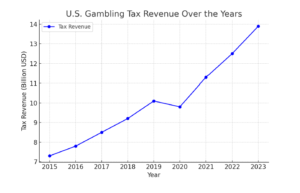Gambling Taxes are a crucial but often overlooked aspect of betting winnings in the U.S. To clarify, did you know that in 2020 alone, Americans wagered over $105 billion on legal gambling activities? With the rise of online and sports betting, gambling is more accessible than ever. However, what many gamblers overlook is the burden of Gambling Taxes that comes with their winnings. In fact, the IRS requires all gambling winnings to be reported as taxable income, whether from a casino, lottery or even casual bets with friends.
Unquestionably, failure to report gambling income can lead to hefty penalties, including interest charges and audits. To illustrate, a notable case involved a professional poker player who failed to report winnings, resulting in a massive IRS fine. Avoiding such issues starts with understanding your tax obligations.
In this blog, we’ll break down how gambling income is taxed, how to deduct losses and recent updates in gambling taxation. Provided that, we’ll share some eye-opening statistics and insights to help you stay compliant while maximizing your tax benefits. In summary, this guide will help you understand how Gambling Taxes work, how to stay compliant, and how to legally reduce your tax liability.
Gambling Taxes: How Your Winnings Are Taxed
When you win money from gambling, it’s not just luck—you owe taxes on it! All winnings must be reported as “Other Income” on Form 1040, Schedule 1, line 8b. This includes:
• Casino winnings (slots, poker, blackjack, etc.)
• Lottery & Raffle prizes
• Sports betting
• Online gambling
• Non-cash prizes (cars, vacations, etc.—taxed at fair market value)
Federal & State Tax Rates on Gambling Winnings
• Federal Tax: The IRS withholds 24% on certain gambling winnings.
• State Tax: Some states, like New York (10.9%) and California (0%), have different rates.
• Local Taxes: Certain cities impose additional Gambling Taxes on winnings, increasing your overall tax burden.
When You’ll Receive a W-2G Form
Casinos and other gambling establishments are required to issue Form W-2G if you meet the following thresholds:
• $1,200+ from bingo or slot machines
• $1,500+ from keno
• $5,000+ from poker tournaments
• $600+ from other gambling activities (if the payout is 300x your wager)
Even if you don’t receive a W-2G, you must still report all winnings on your tax return. Understanding the basics of Gambling Taxes ensures you don’t overlook key IRS rules and deadlines.
Deducting Gambling Losses: What You Need to Know
The good news? You can deduct gambling losses—but only if you itemize deductions. When it comes to Gambling Taxes, your losses cannot exceed your winnings, and you must provide documentation, including:
• Wagering tickets and receipts
• Statements from casinos or betting platforms
• Bank records showing gambling transactions
• A detailed gambling log (date, location, amount won/lost, type of game)
Common Mistakes to Avoid
• Not keeping accurate records of wins/losses
• Assuming losses can be deducted without itemizing
• Forgetting to report online gambling winnings
Professional Gamblers vs. Recreational Gamblers
If gambling is your full-time profession, your taxes work differently. Professional gamblers report their income and losses on Schedule C instead of Schedule A. This allows them to deduct business expenses such as:
• Travel to gambling events
• Gambling software & research tools
• Training & coaching
However, the IRS closely scrutinizes professional gambler claims, requiring proof of consistency and profit motive.
Recent Trends & IRS Crackdowns
IRS Reports $1.4 Billion in Unpaid Gambling Taxes
A Treasury Inspector General report found that between 2018-2020, over 148,908 taxpayers with gambling winnings of $15,000+ failed to report their income, leading to an estimated $1.4 billion in unpaid taxes.
Online Gambling & Sports Betting Boom
With over $93 billion wagered on sports betting in 2023, more states are legalizing online gambling. This has led to increased IRS scrutiny on digital betting platforms and tax reporting compliance.
U.S. Gambling Taxes Revenue Over the Years
This chart illustrates the sharp rise in gambling-related tax revenue collected by the U.S. government, highlighting the growing importance of tax compliance for gamblers.

Key Insights from the Chart
-
Land-based casinos led to a steady rise in tax revenue between 2015 and 2019.
-
COVID-19 restrictions caused a dip in collections during 2020.
-
The legalization of online and sports betting fueled growth from 2021 to 2023.
Conclusion & How FINOVATE Can Help
Understanding gambling taxes is crucial to avoiding penalties and optimizing your financial outcomes. Whether you’re a casual bettor or a professional gambler, keeping accurate records and reporting winnings properly can save you money and stress.
At FINOVATE, we specialize in tax planning and compliance, helping individuals and businesses navigate complex IRS rules. Our experts assist with:
• Gambling income reporting & tax filings
• Maximizing deductions & reducing tax liabilities
• IRS audits & dispute resolution























